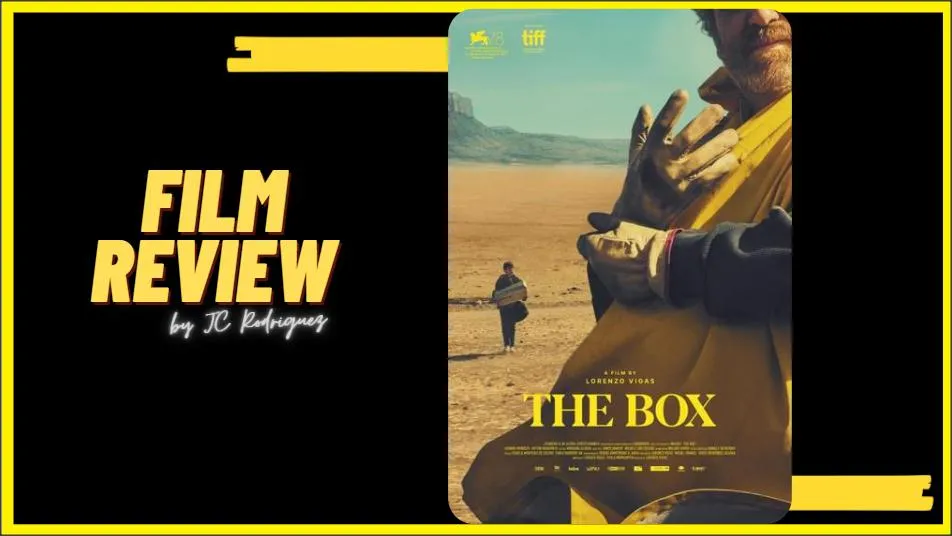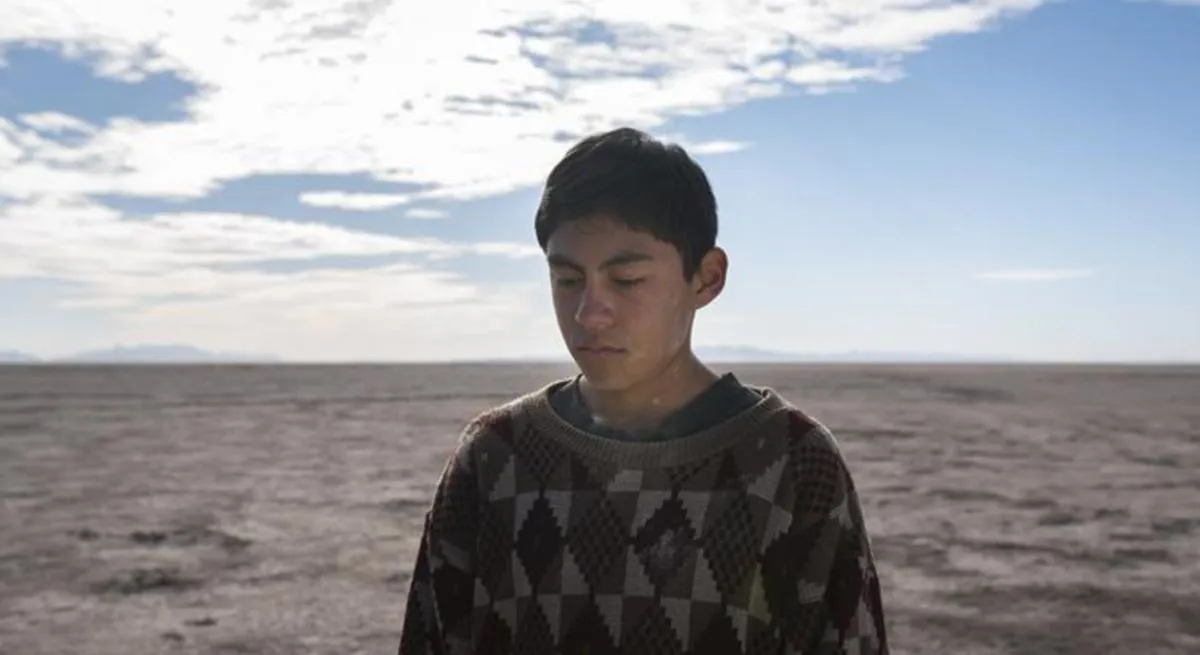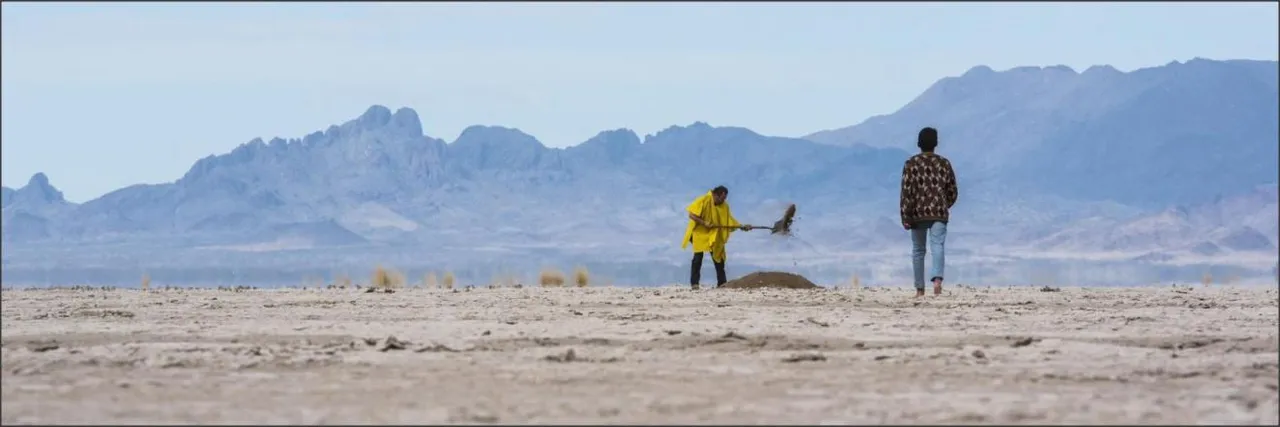An improvised trailer set up by an official agency. People arriving from different parts of the country, waiting for a procedure before the indifferent gaze of public employees, to collect memories of a past that will not return, dreams turned to ashes, remains of social decomposition, lives reduced to dust inside a box.
Un remolque improvisado montado por un organismo oficial. Personas llegadas de distintos puntos del país, esperando un trámite ante la mirada indiferente de empleados públicos, para recoger recuerdos de un pasado que no volverá, sueños convertidos en cenizas, restos de la descomposición social, vidas reducidas a polvo dentro de una caja.


In my previous post I talked about the Mexican film Ruido, which has in common with La Caja the theme of death and the disappeared, but the latter from a different perspective and whose story is more intimate, in addition to covering within its context, a dysfunctional paternal-filial relationship.
The mass graves, full of unidentified corpses, are the product of the excessive violence that has plagued Mexico for many years. Some with victims of drug cartels, others by criminal organizations that traffic in women and surely many other graves dug by the security agencies, which as we all know, are totally corrupt.
Death and violence have become so commonplace that nothing surprises anymore. When the abnormal becomes part of our lives, we have lost a bit of our own humanity. Are we bad people because of it? Are we guilty of something? Not at all, we have to put ourselves in each person's shoes, understand that in the end we are all victims.
Even if we don't have close relatives going through something as horrible as what the film tells, we are still victims, I prefer to think that all our goodness has not been taken away from us. The normalization of violence in our countries is accompanied by fear and resignation that it is a battle we have already lost. The average citizen can only do so much to fight a monster that controls an entire country and has been spread across an entire continent.
When do we realize that we are screwed? Unfortunately, when it's too late. It is when the demon knocks on our door that we realize we have lost, we did not react in time and now we have been engulfed by the beast.
In one of the comments to my previous post, friend Neruel referred to a poem that serves to illustrate why our societies have constantly fallen into the abyss.
You can read Martin Niemöller's poem here
En mi post anterior hablé de la película mexicana Ruido, que tiene en común con La Caja el tema de la muerte y los desaparecidos, pero esta última desde una perspectiva diferente y cuya historia es más íntima, además de abarcar dentro de su contexto, una relación paterno-filial disfuncional.
Las fosas comunes, llenas de cadáveres sin identificar, son producto de la violencia desmedida que azota a México desde hace muchos años. Algunas con víctimas de los cárteles de la droga, otras por organizaciones criminales que trafican con mujeres y seguramente muchas otras fosas cavadas por los organismos de seguridad, que como todos sabemos, son totalmente corruptos.
La muerte y la violencia se han vuelto tan cotidianas que ya nada sorprende. Cuando lo anormal se convierte en parte de nuestras vidas, hemos perdido un poco de nuestra propia humanidad. ¿Somos malas personas por ello? ¿Somos culpables de algo? En absoluto, tenemos que ponernos en la piel de cada persona, comprender que al final todos somos víctimas.
Aunque no tengamos familiares cercanos pasando por algo tan horrible como lo que cuenta la película, seguimos siendo víctimas, prefiero pensar que no nos han quitado toda la bondad. La normalización de la violencia en nuestros países va acompañada del miedo y la resignación de que es una batalla que ya hemos perdido. El ciudadano medio no puede hacer mucho para luchar contra un monstruo que controla todo un país y que ha sido propagado por todo un continente.
¿Cuándo nos damos cuenta de que estamos jodidos? Desgraciadamente, cuando ya es demasiado tarde. Es cuando el demonio llama a nuestra puerta cuando nos damos cuenta de que hemos perdido, no reaccionamos a tiempo y ahora hemos sido engullidos por la bestia.
En uno de los comentarios a mi anterior post, el amigo Neruel hacía referencia a un poema que sirve para ilustrar por qué nuestras sociedades han caído constantemente en el abismo.
Puede leer el poema de Martin Niemöller aquí



La Caja is much more than just another story about families destroyed by violence in Mexico. Another theme touched upon in the film is the subhuman conditions of labor exploitation in many industries located in towns far from the main cities. Labor exploitation is controlled by mafias that supply cheap labor, taking advantage of the needs of people in poor living conditions.
Woe betide anyone who dares to raise his voice to protest or fight for fairer working conditions. He has not realized that he has just signed a pact with the devil and if he does not comply with it, his fate will be to become an identification number in a file with the denunciation of his disappearance.
Silence and indifference will be present again. No one will say they saw something or know something. That may cause us discomfort. We may even feel anger for those people who do nothing, but let's remember what I said in previous paragraphs, they cannot be blamed for acting like that, they are other victims and their survival instinct prevails. What would you do? Would you protest? No, most of us would keep silent, we don't want to be swallowed by the earth and years later our remains put in a box.
La Caja es mucho más que otra historia sobre familias destruidas por la violencia en México. Otro de los temas que se tocan en la película son las condiciones infrahumanas de explotación laboral en muchas industrias ubicadas en pueblos alejados de las principales ciudades. Una explotación laboral controlada por mafias que suministran mano de obra barata, aprovechándose de las necesidades de personas en malas condiciones de vida.
Pobre de aquel que se atreva a levantar la voz para protestar o luchar por unas condiciones laborales más justas. No se ha dado cuenta de que acaba de firmar un pacto con el diablo y si no lo cumple, su destino será convertirse en número de identificación de un expediente con la denuncia de su desaparición.
El silencio y la indiferencia volverán a estar presentes. Nadie dirá que vio algo o que sabe algo. Eso puede causarnos malestar. Incluso podemos sentir rabia por esas personas que no hacen nada, pero recordemos lo que dije en párrafos anteriores, no se les puede culpar por actuar así, son otras víctimas y prevalece su instinto de supervivencia. ¿Qué harías tú? ¿Protestarías? No, la mayoría guardaríamos silencio, no queremos que nos trague la tierra y que años después metan nuestros restos en una caja.


In the midst of all this social context, lies the main plot of the film: The absent father figure in the protagonist's life and his refusal to accept a reality, entering the life of someone who represents that image, leading him down a dangerous, dehumanized and violent path, in exchange for a paternal love that will never exist.
Fuzzy memories of the past. Fragments that his memory tries to recompose. A truth he does not want to accept or a reality that refuses to be accepted. As viewers, we will have some doubts. Is this person his father? Is he an invention of his mind that refuses to accept the truth that fits in a box? Can he start a new life? What if that new world leads him to commit horrible things? Does he have any empathy left?
It's hard to judge Haltzin, that's the name of the story's protagonist. A teenager who wants to fill the void of an absent father because of violence. He is a child of that harshness, as will become evident as the story unfolds and his character evolves. It will be very difficult to condemn him for the horrible things he will have to do, even if they were caused by his own choice, they are consequences of a bigger problem, he is one more victim of a destroyed system.
En medio de todo este contexto social, se encuentra la trama principal de la película: La figura paterna ausente en la vida del protagonista y su negativa a aceptar una realidad, entrando en la vida de alguien que representa esa imagen, llevándole por un camino peligroso, deshumanizado y violento, a cambio de un amor paterno que nunca existirá.
Recuerdos borrosos del pasado. Fragmentos que su memoria intenta recomponer. Una verdad que no quiere aceptar o una realidad que se niega a ser aceptada. Como espectadores, tendremos algunas dudas. ¿Es esta persona su padre? ¿Es una invención de su mente que se niega a aceptar la verdad que cabe en una caja? ¿Puede empezar una nueva vida? ¿Y si ese nuevo mundo le lleva a cometer cosas horribles? ¿Le queda algo de empatía?
Es difícil juzgar a Haltzin, así se llama el protagonista de la historia. Un adolescente que quiere llenar el vacío de un padre ausente por culpa de la violencia. Es hijo de esa dureza, como se hará evidente a medida que se desarrolle la historia y evolucione su carácter. Será muy difícil condenarle por las cosas horribles que tendrá que hacer, aunque hayan sido causadas por su propia elección, son consecuencias de un problema mayor, es una víctima más de un sistema destruido.



I liked the film, not only for the story, the director is the Venezuelan filmmaker Lorenzo Vigas, whose film Desde Allá, awarded at a festival, I saw a few years ago. It was produced in Mexico, but directed by the Venezuelan. In addition, he was also in charge of writing the screenplay, together with the Argentine screenwriter Paula Markovitch.
I want to highlight this, because it is a story set in Mexico, but written and directed by people of other nationalities. This does not detract from the merits of the film, on the contrary, it is a demonstration that film language is universal, no matter the nationality of a filmmaker or screenwriter, creating and telling stories takes an enormous process of research and creation. In addition, being from other Latin American countries with similar issues, they add another perspective to the overall context of the film.
What is the plot?
Haltzin is a teenager who travels by bus to a desert town in northern Mexico. There, a mass grave has been found and several bodies have been identified, including the remains of her father, which were cremated and placed in a coffin-shaped box. When he returns to the city, he sees Mario, a man very similar to his father. The young man decides to enter Mario's life, who sees in the boy qualities that he can take advantage of for his job, which consists of hiring people for a clothing factory that exploits workers. Excited to start a new life, he will soon find himself involved in violent events that will test his morals. Is Mario really his father? Is it all a lie? What is Haltzin willing to do for his father's love? Will he accept that the only thing he has left is the box?
The Box is a painful story about loss and paternal relationships set in a harsh and cruel environment of social degradation. Another play that seeks the audience's reaction, showing what many do not want to see. Remember Martin Niemöller's poem, when they come for you, there will be no one to defend you.
I read your opinion in the comments.
La película me gustó, no sólo por la historia, el director es el cineasta venezolano Lorenzo Vigas, cuya película Desde Allá, premiada en un festival, vi hace unos años. Fue producida en México, pero dirigida por el venezolano. Además, también se encargó de escribir el guión, junto con la guionista argentina Paula Markovitch.
Quiero destacar esto, porque es una historia ambientada en México, pero escrita y dirigida por personas de otras nacionalidades. Esto no le quita méritos a la película, al contrario, es una demostración de que el lenguaje cinematográfico es universal, no importa la nacionalidad de un cineasta o guionista, crear y contar historias lleva un enorme proceso de investigación y creación. Además, al ser de otros países latinoamericanos con problemáticas similares, añaden otra perspectiva al contexto general de la película.
¿Cuál es la trama?
Haltzin es una adolescente que viaja en autobús a un pueblo desierto del norte de México. Allí se ha encontrado una fosa común y se han identificado varios cadáveres, entre ellos los restos de su padre, que fueron incinerados y colocados en una caja con forma de ataúd. Cuando regresa a la ciudad, ve a Mario, un hombre muy parecido a su padre. El joven decide entrar en la vida de Mario, que ve en el chico cualidades que puede aprovechar para su trabajo, que consiste en contratar gente para una fábrica de ropa que explota a los trabajadores. Ilusionado por empezar una nueva vida, pronto se verá envuelto en violentos sucesos que pondrán a prueba su moral. ¿Es Mario realmente su padre? ¿Es todo mentira? ¿Qué está dispuesto a hacer Haltzin por el amor de su padre? ¿Aceptará que lo único que le queda es la caja?
La Caja es una dolorosa historia sobre la pérdida y las relaciones paternas ambientada en un duro y cruel ambiente de degradación social. Otra obra que busca la reacción del público, mostrando lo que muchos no quieren ver. Recuerda el poema de Martin Niemöller, cuando vengan a por ti, no habrá nadie que te defienda.
Leo tu opinión en los comentarios.

Gifs and separators made by me in photoshop


Join the community

